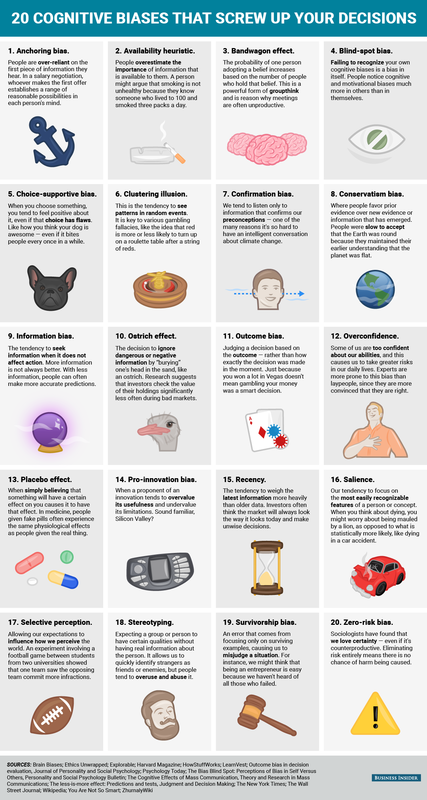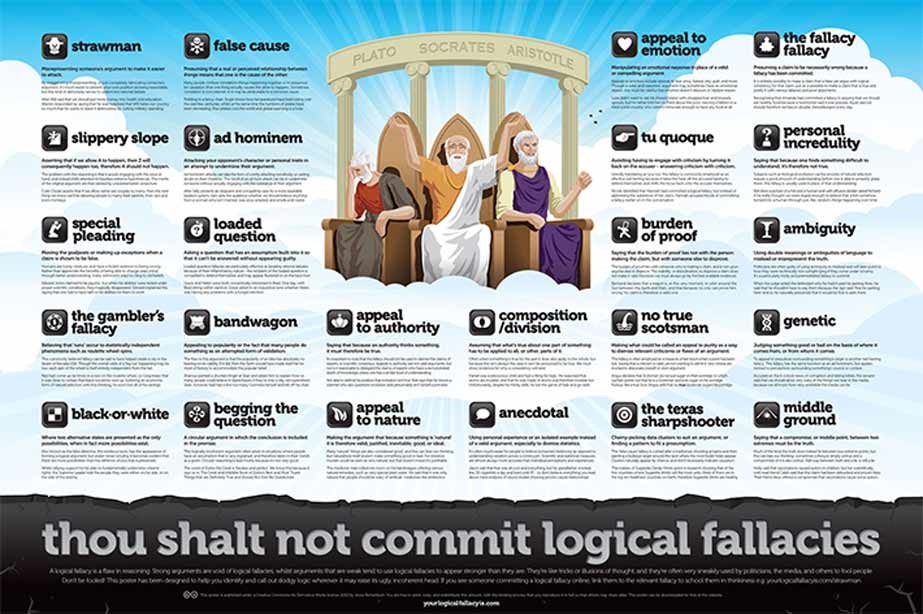Here's a lost of the more common and impactful ones:
|
A while back, I shared a list of logical fallacies. It is important to be aware of fallacious reasoning, especially when engaged in exercises such as philosophy. It is equally important to be aware of cognitive biases, even in simple daily tasks. Most logical fallacies tend to have positive rhetorical impact due to the way our brains work, specifically the illogical biases that they lend themselves to.
Here's a lost of the more common and impactful ones:
0 Comments
Everyone should know by now that I'm morally opposed to taxation in all its forms. Many don't quite understand why that is the case, and those that do tend to disagree based on utilitarian reasoning. If someone has seen my arguments on facebook, read this blog, or spoken to me in person for even fifteen minutes, and still do not understand my moral opposition to taxation, there is nothing I can do to help him.
The difficulty with utilitarian justifications (for anything, not just taxation) is that it compartmentalizes individual actions. Why is it moral to abort Hitler but immoral to abort someone else's baby? Why is it immoral to mug a guy in a back-alley (assuming you don't really, really need that money) but it is moral to take a percentage of their hard-earned wages against their will? Utilitarian thought obfuscates moral and ethical considerations with a certain pragmatic results-oriented thought in which a perceived end can justify any action. One useful tool to double-check utilitarian arguments for rectitude is to find the logical form of the argument being made and replace terms with functionally equivalent terms and see if the argument still matches one's intuition. Sax and Violence is an excellent, artful, and cogent demonstration of this approach to double-checking a utilitarian argument. There are those out there who will find that both taxes and saxes match their intuition... and those people terrify me. There are those that will discover that both taxes and saxes are counter-intuitive after reading this article, as well. However, it would take an act of willful ignorance to say that one is morally justified whilst the other is not. You can watch a video that has a reading of the text and a further exploration of the idea, but the audio quality is a little shoddy.
I still haven't figured out how I feel about Adam Kokesh, the man. I know very little about his philosophical groundings, as well. However, this is a paradigm case of Nonviolent Communication in action.
If anyone read the book (or at least my post about the book) and was skeptical of how it could possibly work, here is Adam Kokesh turning what would have likely escalated to the point that somebody would die into a deep intellectual conversation in which someone was forced to address the shortcomings of their worldview. I told myself I was going to take a break from recommending Tom Woods material for a while, but here I am again. This guy's just a genius, and I'm too busy to find something better than what this guy has to offer. This is it, though. I'm taking a one-week break from recommending Woods.
This podcast, Is Reason Enough? (and the additional materials), seems to be an important tool when trying to change other people's minds (something that cannot be done over social media, as they explore in this podcast). One will notice the striking resemblance that it bears to NonViolent Communication. I don't believe this is a mistake, given the results I've had with NVC and the results that are expected with the method of discussion as seen in today's podcast. The first podcast I ever downloaded, The Partially Examined Life, is a perennial staple of my podcast-listening and self-education. Their Zero Episode does a great job of introducing their project. I have gotten the most out of their podcast by reading the material ahead of time, listening to the podcast, and then talking to someone (anyone) about the material discussed and trying to tease any kind of intellectual response out of them. Previous attendees of my mostly-defunct philosophy club will recognize several of these episodes and ideas. I understand several of the earlier episodes (my favorite ones) are behind a paywall these days, but people have to make a living, right? They're up on iTunes and all the other podcast aggregators. My favorite episode is probably their 100th episode... however, their commentaries on Camus, MacIntyre, Antigone, etc. are amazing. I recommend starting at the beginning and moving on from there, as they do build on past episodes in order to be able to address higher-level and more esoteric concepts later on.
This site is a useful tool for the logician, rhetorician, internet sophist, and anyone else interested in either improving their own grasp of logic or demeaning others for their lack of logical acuity. A handy, accessible, and informative introduction to logical fallacies, this site is excellent for remedial logic development, since mainstream schooling has abandoned classical education.
While these little blurbs are useful, they do not fully explore the nature of these fallacies and they focus primarily on the formal (or logical) fallacies as opposed to the innumerable rhetorical fallacies that have been discussed in philosophy, but this is a great starting place for the beginner and a useful tool for the expert to help beginners understand. Disclaimer: People are often tempted to resort to the fallacy fallacy (depicted on this site) when discovering how common fallacious reasoning is in common discourse, discounting anything someone has to say because they were inarticulate in their expression of an idea. This is especially prevalent in liberal circles, where one is trained in the course of liberal arts education to do so (ad hominem, I know). Just try not to be "that guy" when you're out there battling for Truth. This was intended for posting yesterday, but real life interfered with my blogging life. I hope to post today's suggestion tonight, as scheduled. An excellent resource I read back in my communist days, Isaiah's Job, describes a very intelligent approach to populism and the reality that those seeking truth face. When I first read it, I was surprised that an evil capitalist could understand the human condition so well... and later calked it up to marketing skills. Now that I've come out the other side of that long, dark night that is communism, I have a renewed appreciation for Albert Nock and the influence he has had on economics. Without Nock, we may not have had Rothbard. I think this is my favorite essay by Nock and it deserves a good read, especially if someone is trying to understand why I say what I do on facebook, and write what I write here, especially since it looks like nobody is listening. https://mises.org/library/isaiahs-job "Tell them what a worthless lot they are. Tell them what is wrong, and why and what is going to happen unless they have a change of heart and straighten up. Don't mince matters. Make it clear that they are positively down to their last chance. Give it to them good and strong and keep on giving it to them. I suppose perhaps I ought to tell you that it won't do any good. The official class and their intelligentsia will turn up their noses at you and the masses will not even listen. They will all keep on in their own ways until they carry everything down to destruction, and you will probably be lucky if you get out with your life." |
Archives
October 2015
Categories
All
|






 RSS Feed
RSS Feed
